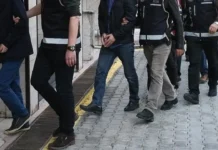Turkish Interior Minister Ali Yerlikaya and other senior officials are facing growing condemnation from legal and human rights groups for what critics describe as incitement, public targeting and the legitimization of mistreatment of staffers from the satirical LeMan magazine, which is under criminal investigation over a cartoon accused of depicting the Prophet Muhammad, Turkish Minute reported.
The controversy erupted after LeMan published a cartoon in its June 26 issue that many interpreted as depicting the Prophet Muhammad — a claim the magazine denies. The drawing showed two elderly figures, one labeled “Muhammad” and the other “Moses,” shaking hands mid-air above a war zone. According to LeMan, the cartoon was intended as a symbolic anti-war message, not as a depiction of the Prophet.
Nonetheless, top government officials quickly condemned the cartoon, framing it as blasphemy. Interior Minister Yerlikaya called the drawing “vile” and those responsible “shameless,” repeatedly declaring they “will pay before the law.” In a series of posts on X, he announced and praised the detentions of LeMan’s cartoonist, graphic designer, managing editor and others — often referring to them only by their initials, posting detention footage and describing the publication as “insulting to our Prophet.”
Critics say these statements amounted to incitement and directly contributed to a violent mob attack outside LeMan’s office in İstanbul on Monday. Scores of angry Turks gathered on İstiklal Avenue, shouting “Allahu Akbar” and “Long live Sharia,” smashing windows and attacking a nearby bar known to be frequented by the magazine’s staff. Riot police used tear gas and rubber bullets to disperse the crowd. At least 250 people participated in the protest, which resulted in street clashes and prompted the Beyoğlu district governor to impose a 24-hour ban on public gatherings.
Video footage showed LeMan staff being detained at night, barefoot, with their hands cuffed behind their backs, and dragged down stairs by police. Human rights organizations, lawyers and opposition figures have condemned both the conduct of the police and the rhetoric of government ministers as violations of domestic and international legal standards.
The Human Rights Association (İHD) issued a public condemnation of the detentions and the government’s conduct. “The person taken into custody was subjected to mistreatment — despite showing no resistance — including being handcuffed behind his back and dragged on the ground,” the group said and added, “These images were circulated as legitimate by the Interior Ministry.”
Turkey’s Contemporary Lawyers Association said the police’s conduct amounted to mistreatment. “The cartoonist and staff were detained under conditions that violate both domestic and international law. The Interior Minister’s public statements have legitimized mistreatment and encouraged the perpetrators,” the group said.
Other organizations, including the İstanbul Medical Chamber, denounced the treatment of LeMan staff, particularly the use of reverse handcuffs, dragging detainees barefoot and releasing the footage to the public. They described the behavior as illegal under Turkish law and international treaties to which Turkey is a party, including the UN’s Mandela Rules on the treatment of prisoners.
Justice Minister Yılmaz Tunç backed the legal proceedings, citing Article 216/3 of the Turkish Penal Code, which criminalizes “openly insulting religious values.”
Presidential Communications Director Fahrettin Altun echoed this, calling the cartoon an “immoral provocation” and warning that Turkey “will not allow such attacks on our values.”
Yet civil society leaders and opposition voices say it is the government’s language — rather than the cartoon itself — that has endangered public safety.
“Ministers have turned into judges. They are praising the unlawful treatment [of the detainees],” said Ömer Faruk Gergerlioğlu, an MP and prominent human rights advocate.
His son, Salih Gergerlioğlu, also defended the magazine, noting that while he had criticized LeMan in the past over its controversial portrayals during Turkey’s headscarf bans, the magazine in recent years had stood by victims of state repression across ideological lines. “As a devout Muslim, I did not see the cartoon as an insult to my Prophet,” he said. “People who want to defend the Prophet should defend human rights.”
Eren Keskin, a prominent human rights lawyer and co-chair of the Human Rights Association, said the threats made by protesters outside the magazine office — such as promising death to the cartoonists — could fall under the same legal provision the state is using against LeMan.
“Different opinions are allowed, but incitement to violence is a crime,” she said.
Lawyers commenting on Yerlikaya’s social media posts underlined that the public display of reverse-handcuff images of detainees was in itself unlawful and amounted to encouraging mistreatment.
The İstanbul Governor’s Office has since banned all demonstrations around the LeMan office for 24 hours. As of July 1, the magazine’s building remained under police control, and its editors have not announced whether the next issue will be published.
Opposition figures, including media personalities and former MPs, have also drawn attention to the disparity in how the government responds to protests. While peaceful demonstrations by labor unions or students are routinely banned and dispersed, the authorities allowed the LeMan protests to unfold for hours before intervening — despite clear signs of escalation.
The editorial board of LeMan has denied the cartoon was blasphemous and issued a formal apology to readers who felt offended, while stressing that the character “Muhammad” was meant to be a Muslim victim of war, not the Prophet. “Our intention was to show peace between Abrahamic faiths in a time of conflict,” the statement read. The magazine also highlighted its decades-long support for Palestinian causes, including publishing special issues on Israeli attacks in Gaza and the 2010 Mavi Marmara raid.
LeMan’s editor-in-chief, Tuncay Akgün, speaking from abroad, said the magazine had been systematically misrepresented by government officials seeking political gain.
Unlike previous international cartoon controversies — where Muslim-majority governments protested Western publications — this case has seen a Muslim-majority government detain its own satirists.















